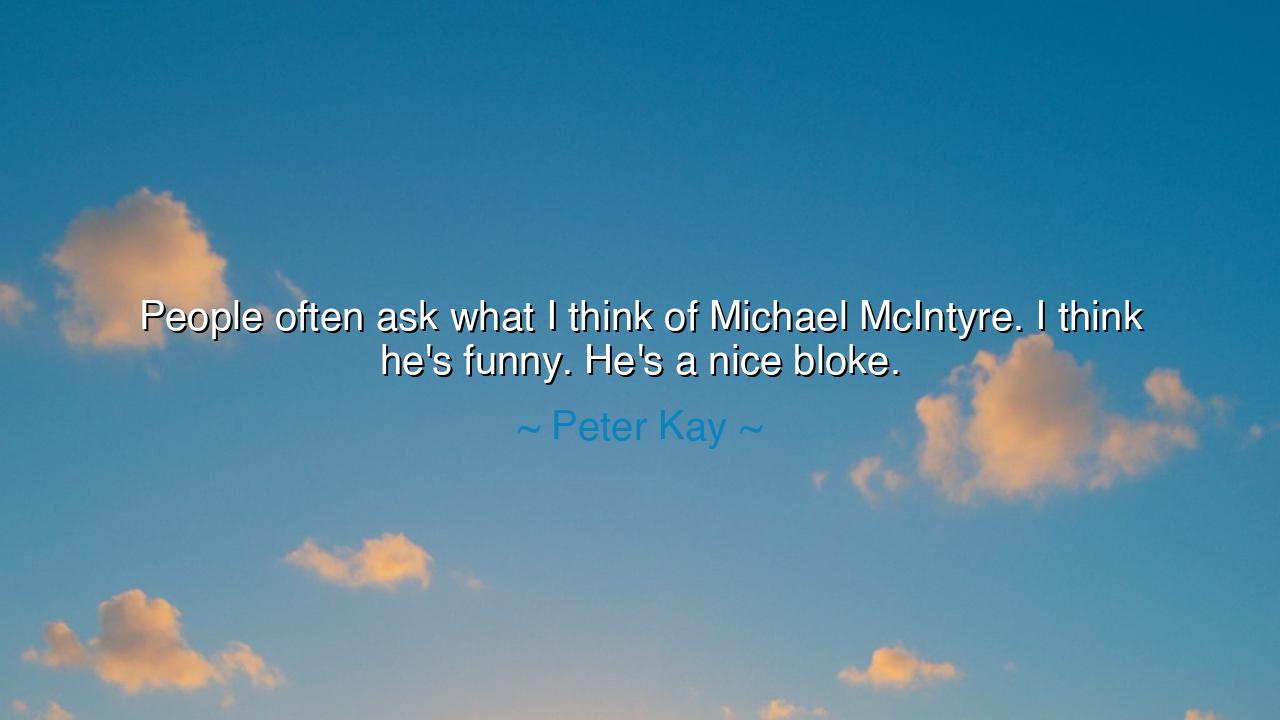
People often ask what I think of Michael McIntyre. I think he's
People often ask what I think of Michael McIntyre. I think he's funny. He's a nice bloke.






When Peter Kay said, “People often ask what I think of Michael McIntyre. I think he’s funny. He’s a nice bloke,” his words were simple, almost casual — yet beneath their lightness lies a profound lesson in humility, respect, and the quiet nobility of generosity. It is a statement that, like much of Kay’s comedy, carries the wisdom of ordinary life. In a world eager for rivalry, for comparison, for conflict between the gifted, he instead chose the path of grace. He did not elevate himself, nor diminish another. He simply recognized goodness where he saw it — humor and kindness — and in doing so revealed that true greatness needs no boast, nor jealousy, nor defense.
The origin of this quote lies in the realm of British comedy, where Kay and McIntyre are both giants of laughter. Each has filled arenas and brought joy to millions, their styles as distinct as the voices of two storytellers by the same fire. Peter Kay, the bard of nostalgia and the humor of the everyday, finds his comedy in the rhythms of family, friends, and simple truths. Michael McIntyre, the whirlwind of energy and wit, paints the absurdity of modern life in vivid color. It would have been easy — perhaps even expected — for Kay to respond to questions about McIntyre with rivalry or comparison. But instead, he chose kindness. “He’s funny. He’s a nice bloke.” In those few words, he elevated both his peer and himself.
In the ancient world, such modesty was known as a mark of wisdom. The philosopher Epictetus once taught that praise should be given freely, and envy should be met with silence, for “the sun loses nothing by the light of another.” Kay’s response reflects this ancient truth: that acknowledging another’s light does not dim one’s own. Indeed, it makes it shine brighter. In admiring McIntyre without reservation, Kay demonstrates the humility of one secure in his craft — a man who understands that laughter is not a battlefield but a bridge. His words remind us that respect between creators is the highest form of artistry, for it honors the shared purpose that unites them — the gift of bringing joy.
Throughout history, we find echoes of this same spirit. Consider Leonardo da Vinci and Michelangelo, both masters of the Renaissance. The world often pitted them against each other, whispering of competition and envy. Yet Leonardo, in his writings, often spoke with admiration for Michelangelo’s genius, recognizing in his rival not an enemy, but a mirror of excellence. Likewise, Kay sees in McIntyre not a threat, but a fellow craftsman, carving humor from the stone of human experience. In both art and comedy, such generosity of spirit is rare, for it requires strength of heart to celebrate another’s brilliance without resentment.
The simplicity of Kay’s words also hides a deeper beauty — the affirmation of kindness as a virtue equal to talent. “He’s funny,” Kay says first, honoring McIntyre’s gift. “He’s a nice bloke,” he adds, affirming character above craft. In those few syllables, he reminds us that skill, no matter how dazzling, is hollow without decency. The ancients would have called this the balance of arete — excellence not just in ability, but in soul. To be great and good is the rarest harmony, and Kay, in recognizing both, calls his listeners to look beyond fame and toward humanity.
There is also wisdom in the brevity of his answer. Where others might have spoken at length, Kay’s few words carry the weight of sincerity. Brevity, as the Stoics believed, is the language of truth. In a time when opinions are endless and shallow, restraint becomes a form of depth. Kay’s succinct response is not indifference — it is clarity. It is the steady voice of one who knows that praise need not be elaborate to be true. Like a craftsman who finishes his work with a single, confident stroke, he speaks plainly, and his honesty resounds.
So, my children, take this teaching to heart: speak well of others, and mean it. Do not let the world’s hunger for rivalry or gossip twist your spirit. When asked to judge, choose generosity. When given a chance to compare, choose understanding. To see another’s success and call it good is not weakness — it is strength beyond measure. For only the secure can admire freely, and only the wise can find peace in the joy of another.
Thus, in Peter Kay’s simple words — “He’s funny. He’s a nice bloke.” — lies a quiet anthem of humility. Let them guide you in your own life. Be generous in praise, gentle in judgment, and confident enough to honor the talents of others. For in doing so, you not only uplift those around you — you purify your own heart. And as the ancients knew well, the spirit that celebrates goodness will itself be remembered as good.






AAdministratorAdministrator
Welcome, honored guests. Please leave a comment, we will respond soon